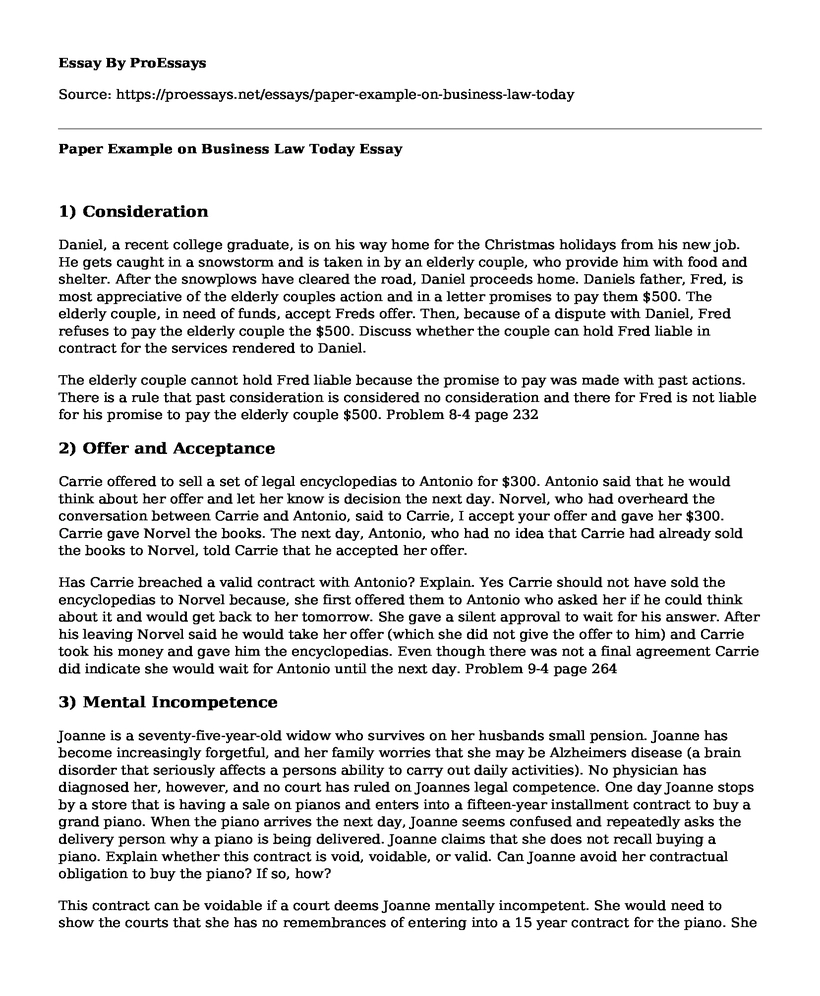1) Consideration
Daniel, a recent college graduate, is on his way home for the Christmas holidays from his new job. He gets caught in a snowstorm and is taken in by an elderly couple, who provide him with food and shelter. After the snowplows have cleared the road, Daniel proceeds home. Daniels father, Fred, is most appreciative of the elderly couples action and in a letter promises to pay them $500. The elderly couple, in need of funds, accept Freds offer. Then, because of a dispute with Daniel, Fred refuses to pay the elderly couple the $500. Discuss whether the couple can hold Fred liable in contract for the services rendered to Daniel.
The elderly couple cannot hold Fred liable because the promise to pay was made with past actions. There is a rule that past consideration is considered no consideration and there for Fred is not liable for his promise to pay the elderly couple $500. Problem 8-4 page 232
2) Offer and Acceptance
Carrie offered to sell a set of legal encyclopedias to Antonio for $300. Antonio said that he would think about her offer and let her know is decision the next day. Norvel, who had overheard the conversation between Carrie and Antonio, said to Carrie, I accept your offer and gave her $300. Carrie gave Norvel the books. The next day, Antonio, who had no idea that Carrie had already sold the books to Norvel, told Carrie that he accepted her offer.
Has Carrie breached a valid contract with Antonio? Explain. Yes Carrie should not have sold the encyclopedias to Norvel because, she first offered them to Antonio who asked her if he could think about it and would get back to her tomorrow. She gave a silent approval to wait for his answer. After his leaving Norvel said he would take her offer (which she did not give the offer to him) and Carrie took his money and gave him the encyclopedias. Even though there was not a final agreement Carrie did indicate she would wait for Antonio until the next day. Problem 9-4 page 264
3) Mental Incompetence
Joanne is a seventy-five-year-old widow who survives on her husbands small pension. Joanne has become increasingly forgetful, and her family worries that she may be Alzheimers disease (a brain disorder that seriously affects a persons ability to carry out daily activities). No physician has diagnosed her, however, and no court has ruled on Joannes legal competence. One day Joanne stops by a store that is having a sale on pianos and enters into a fifteen-year installment contract to buy a grand piano. When the piano arrives the next day, Joanne seems confused and repeatedly asks the delivery person why a piano is being delivered. Joanne claims that she does not recall buying a piano. Explain whether this contract is void, voidable, or valid. Can Joanne avoid her contractual obligation to buy the piano? If so, how?
This contract can be voidable if a court deems Joanne mentally incompetent. She would need to show the courts that she has no remembrances of entering into a 15 year contract for the piano. She is now 75 and in 15 years she would be 90 what company would allow someone to enter into this type of contract without first consulting one her family members. This point might be good enough for the judge to allow this contract voidable as long as Joanne returns (or never accepted) the piano and pays any portion of time that this takes to be resolved in court. Problem 10-1 page 297
4) Third Party Beneficiaries
Wilken owes Rivera $2,000. Howie promises Wilken that he will pay Rivera the $2,000 in return for Wilkens promise to give Howies children guitar lessons. Is Rivera an intended beneficiary of the Howie-Wilken contract? Explain.
Yes, because Rivera is the one who is owed the money and Howie will pay this for Wilken as long as Wilken gives his kids guitar lessons. All three are party to the contract. Problem 10-2 page 297
5) Liquidated Damages
Carnack contracts to sell his house and lot to Willard for $100,000. The terms of the contract call for Willard to make a deposit of 10 percent of the purchase price as a down payment. The terms further stipulate that should the buyer breach the contract, Carnack will retain the deposit, but because her expected financing of the $90,000 balance falls through, she breaches the contract. Two weeks later, Carnack sells the house and lot to Balkova for $105,000. Willard demands her $10,000 back, but Carnack refuses, claiming that Willards breach and the contract terms entitle him to keep the deposit. Discuss who is correct.
In this case Carnack is in the right. Willard did sign a contract with the stipulation that if there was a breach in the contract Carnack would keep the 10% down payment. Willard was unable to keep their end of the deal because of the financing falling though and this caused Willard to breach or back out of the deal.
References
Miller, R. L., & Jentz, G. A. (2011). Business Law Today. Mason: South-Western Cengage Learning.
Cite this page
Paper Example on Business Law Today. (2021, Dec 14). Retrieved from https://proessays.net/essays/paper-example-on-business-law-today
If you are the original author of this essay and no longer wish to have it published on the ProEssays website, please click below to request its removal:
- Chick-n-Gravy Dinner Line Case Study
- The Viability of the Opal Business Venture in Europe Paper Example
- Financial Analysis of Apple Company Paper Example
- UK Income Tax: Growing Concern Over Inequality and Poverty - Essay Sample
- School Property Tax Debate Reaches PA: Argall's Tax Shift Plan Criticized - Essay Sample
- Essay Example on Comparing Apollo Global & American Financial Group: Key Insights for Investors
- International Trade: Gaining a Competitive Edge - Essay Sample







